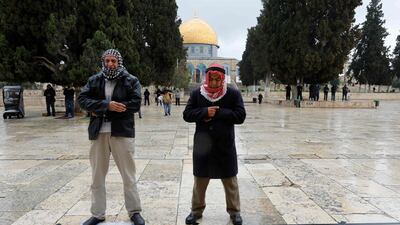Prayers continue to ring out from Jerusalem’s Old City despite tightening restrictions over the coronavirus pandemic, with authorities intent on keeping holy sites open to preserve the city’s fragile peace.
Hours after Israeli Prime Minister Benjamin Netanyahu announced the latest measure in the “war on corona”, ordering people to stay in their homes for a week, Muslims gathered for Friday prayers at the Al Aqsa mosque compound.
This week worshippers have been praying in the open air at the complex, the third-holiest site in Islam, as the Al Aqsa mosque and Dome of the Rock have been closed due to the pandemic.
“They know what coronavirus means, they are praying outside the mosque,” said Bassam Abu Lidah from the Islamic Waqf, which administers the site.
Thick tape has been rolled out across the stone, marking spaces for worshippers to stand two metres apart. Another Waqf employee said worshippers were being given hand sanitiser as they arrived.
Efforts are also being made to raise awareness about the pandemic, as coronavirus cases in Israel topped 700 and reached 48 in the occupied West Bank.
“We tell people how to take care of themselves, then the imam is telling people how to pray. Everything is under control,” said Mr Abu Lidah.

Attendance is lower because some people are choosing to stay home, while others are prevented from travelling to the Old City due to restrictions by Palestinian and Israeli authorities to contain the virus.
The Palestinian Authority imposed a state of emergency two weeks ago after a coronavirus outbreak in the city of Bethlehem, while the occupied West Bank has since been closed off.
The Israeli government is allowing people to leave their homes for worship, although gatherings are limited to 10 people. Police have been co-ordinating with the Waqf to ensure prayers can continue.
Israeli police spokesman Micky Rosenfeld told The National the force was "taking every step and measure to enable the prayers to take place and at the same time also maintain the safety of the public".
The site of the Al Aqsa complex, known as Haram Al Sharif, is also revered by Jews as the Temple Mount and has been a focal point of the Israeli-Palestinian conflict. The second intifada erupted after Israeli politician Ariel Sharon visited the site in 2000. In 2017, protests and clashes broke out after Israeli authorities installed metal detectors at the complex after two police officers were killed there. Israel ultimately scrapped the measure.
Stopping access to the Al Aqsa mosque and the Dome of the Rock this week was received calmly, in part because it was announced by the Waqf, according to Anwar Mhajne, assistant professor at Stonehill College in the United States.
“If it had come from Israeli authorities I think the response would have been negative,” she said.
Acceptance of the closures also shows how afraid people are of the coronavirus, Ms Mhajne said, while keeping the complex open allows Muslims to decide for themselves whether to attend prayers.
“Making it voluntary for people not to come is different to forcing them not to go,” she added. “That would be associated with religious tension.”
But only those living locally have the option as foreign visitors have been banned, leaving the narrow streets of the Old City empty of pilgrims.
At the Western Wall, the holiest site where Jews are allowed to pray, worshippers have been asked not to kiss the stones. Yellow tape flapping in the wind marks where they are allowed to stand, two metres apart and in blocks of not more than 10 people.
“Medically speaking, the coronavirus attacks the respiratory system, but the last few days have taught us that it attacks our souls no less,” the Western Wall’s rabbi, Shmuel Rabinowitz, said on Sunday.
He took part in a “special prayer for the end of the pandemic” on Thursday, which the Western Wall Heritage Foundation said was for “the complete recovery of the entire world”.
Nearby at the Church of the Holy Sepulchre, believed to be the site where Jesus was crucified and buried, the heavy wooden doors remain open. But just a handful of Christians could be seen crossing the threshold earlier this week to light candles and pray.
The church is shared by various denominations, who issued a joint statement last week urging Christians to follow the instructions of their local authorities regarding the coronavirus.
There is no indication yet that the church will close, a decision last taken in 2018 over a tax dispute with Israeli authorities. But celebrations have been either cancelled or restricted to adhere to the new measures, just weeks ahead of Easter.
As coronavirus cases continue to rise, the Custodian of Catholic Church in the Holy Land, Francesco Patton, urged the faithful to abide by the rules while making their own effort to halt the outbreak.
“I ask once again to intensify our fasting and prayer so that this pandemic can end as soon as possible,” he said.


